Today Current Affairs: 17th September 2022 for UPSC IAS exams, State PSC exams, SSC CGL, State SSC, RRB, Railways, Banking Exam & IBPS, etc
Table of Contents
26th Meeting Of The Financial Stability And Development Council:
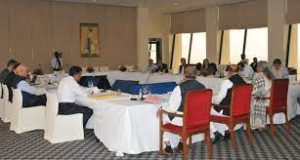
The Union Minister of Finance and Corporate Affairs chaired the 26th Meeting of the Financial Stability and Development Council (FSDC).
Key Highlights:
- The council stressed on the early warning indicators for the economy and the preparedness to deal with them, improving the efficiency of the existing financial and credit information systems, and issues of governance and management in systemically important financial institutions.
- It was noted that there is a need to monitor the financial sector risks, the financial conditions and market developments on a continuous basis by the Government and the regulators so that appropriate and timely action can be taken so as to mitigate any vulnerability and strengthen financial stability.
- The council took note of the preparation in respect of financial sector issues to be taken up during India’s G20 Presidency in 2023.
FSDC:
- It is a non-statutory apex council under the Ministry of Finance constituted by the Executive Order in 2010.
- The Raghuram Rajan committee (2008) on financial sector reforms first proposed the creation of FSDC.
- It is chaired by the Finance Minister and its members include the heads of all Financial Sector Regulators (RBI, SEBI, PFRDA & IRDA), Finance Secretary, Secretary of Department of Economic Affairs (DEA), Secretary of Department of Financial Services (DFS), and Chief Economic Adviser.
- In 2018, the government reconstituted FSDC to include the Minister of State responsible for the Department of Economic Affairs (DEA), Secretary of Department of Electronics and Information Technology, Chairperson of the Insolvency and Bankruptcy Board of India (IBBI) and the Revenue Secretary.
- FSDC sub-committee is headed by the Governor of RBI.
- The Council can invite experts to its meeting if required.
Ramakrishna Mission’s Awakening Programme:
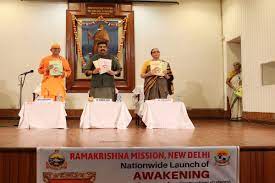
The Union Minister for Education launched Ramakrishna Mission’s ‘Awakening’ Programme for school students.
- It is an initiative towards ensuring overall personality development of a child in line with the philosophy of National Education Policy (NEP), 2020.
- It is for the students of classes I to V.
- Ramakrishna Mission, Delhi branch, from 2014 onwards, has been successfully conducting the Awakened Citizen Program (ACP) for middle school students to enable them to build “ATMASHRADDHA” (Self-esteem) and make responsible choices.
- It helps them to find solutions for all problems of life.
- There has been a demand from educationists for a similar program for Primary school students.
- In response to this, ‘Awakening’ has been designed and piloted across 126 schools.
AgriTech Summit:

The Union Minister for Agriculture and Farmers Welfare addressed the ‘Outlook Agritech Summit and Swaraj Awards 2022’.
AgriTech Summit:
- Agritech Summit is a platform to bring together the top political leadership, policymakers, thought leaders and companies involved in agriculture-related technology to share knowledge and recognise the best practices in the field of agriculture in India.
- The annual awards recognise the best performances and innovations in the field of agriculture, and recognise those who are pushing the envelope by using smart technology.
- The awards were given to various Krishi Vikas Kendras, Farmers’ Producers Organisations as well as individual scientists.
- The Swaraj Award was organised in association with the Indian Council of Agricultural Research (ICAR) and the Ministry of Agriculture and Farmer’s Welfare.
India Discrimination Report:

The India Discrimination Report which is released by Oxfam India highlighted that women and marginalized communities suffered discrimination in the job market.
Highlights of the Report:
- The dataset was taken from the 61st round of the National Sample Survey on employment unemployment (2004-05), the Periodic Labour Force Survey (PLFS) in 2018-19 and 2019-20, and the All-India Debt and Investment Survey by the Centre.
- Schedule caste/Schedule tribe: There has been a decline in discrimination in urban areas due to education and supportive government policies.
- Difference in Earning: The average earning of self-employed workers in 2019-20 was Rs 15,878 for people from non-SCs/ST categories, while it is Rs 10,533 for those from SC or ST backgrounds.
- Self-employed non-SC/ST workers earn a third more than their counterparts from SC or ST backgrounds.
- Rise in discrimination in Rural areas: The SC and ST communities in rural India are facing an increase in discrimination in casual employment.
- Women: Discrimination against women is so high that there is hardly any difference across religion or caste-based sub-groups, or the rural-urban divide.
- The discrimination increased for women in this period — from 67.2% in 2004-05 to 75.7% in 2019-20.
- Earning Gap between Males & Females: The earning gaps are large, both in rural and urban areas for casual workers ranging between 50% and 70%. The range is low for regular workers, with earnings of men exceeding those of women by 20 and 60%.
- In the case of the self-employed, the disparity is much higher, with men earning 4 to 5 times that of women.
- Gender discrimination in India is structural which results in great disparities between earnings of men and women under ‘normal circumstances.
Automobile Industry In India:

The Union Minister of Commerce and Industry addressed the 62nd Automotive Component Manufacturers Association (ACMA) Annual Session.
- The Theme of the session was ‘Future of Mobility – Transforming to be Ahead of Opportunity’.
- The ACMA is the apex body representing the interest of the Indian Auto Component Industry. Its membership of over 850 manufacturers contributes to more than 85% of the auto component industry’s turnover in the organized sector.
Highlights of the Session:
- The 5-point action agenda was given for the Automobile Industry:
- To Focus on Quality in order to become globally competitive and reduce dependence on imports.
- To Think holistically and have a larger vision to engage with others in the spirit of openness and competitiveness.
- To Give emphasis on Value Addition.
- To Exit the Uncompetitive market and explore new market opportunities in the sectors where we can be competitive.
- To Think big and set aggressive targets and ambitions for the industry.
- Further, the government emphasize that future of the Automotive Component Industry rests on being more Connected, focusing on Convenience, orienting towards Clean Energy and clean mobility and using Cutting-edge technology.
Shallow Water Mining:
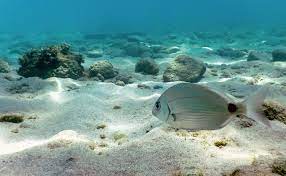
A group of researchers has suggested that Shallow Water Mining is in direct conflict with Biodiversity Conservation and Sustainability Goals, as the activity poses severe environmental risks.
- Shallow-water mining takes place at depths less than 200 metres and it has been touted as less destructive than terrestrial mining and less risky than mining in Deep-Water Ecosystems.
- It is considered a relatively low-risk and low-cost option to satisfy the demand for metals and minerals. Also, technology for shallow-water mining already exists.
- Shallow-water mining projects are already underway in Namibia and Indonesia, and projects have been proposed in Mexico, New Zealand, and Sweden.
- Shallow Water Mining is not a sustainable substitute for Deep-Sea Mining.
- The part of the ocean that lies below a depth of 200 meters is defined as the deep sea, and the process of extracting minerals from this area is known as deep-sea mining.
- Mining metals from the shallow-water ocean floor requires removing large amounts of sediment.
- Removing these sediments, which takes thousands of years to accumulate, means jeopardizing organisms that call it home.
La Niña:
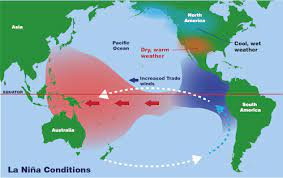
The Australian Bureau of Meteorology on September 13 confirmed the occurrence of La Niña phenomenon for the third consecutive year in the Pacific Ocean.
- The World Meteorological Organisation (WMO) on August 31 had stated that the oceanic and atmospheric phenomenon would last until at least the end of the year, and for the first time this century, span three consecutive northern hemisphere winters to become a ‘triple dip’ La Nina.
- El Nino and La Nina, which mean ‘the boy’ and ‘the girl’ in Spanish, are mutually opposite phenomena, during which an abnormal warming or cooling of sea surface temperatures is observed in the Pacific Ocean along the equator, off the coast of South America.
- Together they constitute what is known as the El Niño-Southern Oscillation system, or ENSO for short.
- ENSO conditions can alter both temperatures and rainfall globally, due to their strong interference on global atmospheric circulations.
- It is a recurring phenomenon and the change in temperature is accompanied by changes in the patterns of upper and lower level winds, sea level pressure, and tropical rainfall across the Pacific Basin.
- Normally, El Nino and La Nina occur every four to five years.
Vinesh Phogat:

Vinesh Phogat has become the first Indian woman wrestler to win two medals at the World Championships after clinching a bronze in 53 kilogram category in Belgrade, Serbia.
- The Commonwealth Games 2022 gold medalist defeated reigning European champion Emma Malmgren of Sweden.
- This is her second bronze medal at the Championships. She had previously earned a podium position in the 2019 edition of the tournament at Nur-Sultan, Kazakhstan.
- Vinesh Phogat is an Indian wrestler. She became the first Indian woman wrestler to win gold in both Commonwealth and Asian Games.
- Phogat became the first Indian athlete to be nominated for Laureus World Sports Awards in 2019.
- Vinesh is the cousin of wrestlers Geetha and Babita. Both her cousins have won gold in 55 kg category in Commonwealth Games.
Tribals Peace Agreement:
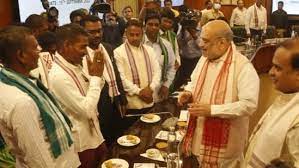
A tripartite peace agreement was signed between Centre, Assam Government and eight tribal groups of Assam in the presence of Union Home Minister Amit Shah in New Delhi.
- The agreement was signed to end decade old crisis of tribal groups and tea garden workers in Assam.
- The tribal groups which have signed the agreement include, Birsa Commando Force, Adivasi People’s Army, All Adivasi National Liberation Army, Adivasi Cobra Military of Assam and Santhal Tiger Force.
- The agreement will prove to be another milestone in the direction of making North East region extremism free by 2025.
Shah said, several agreements have been signed to ensure peace and development in the North Eastern region in the last three years. - He said, NLFT agreement in 2019, BRU-REANG and Bodo accord in 2020, Karbi Anglong agreement in 2021 and Assam-Meghalaya inter-state boundary agreement this year has resolved around 65 per cent of border disputes.




